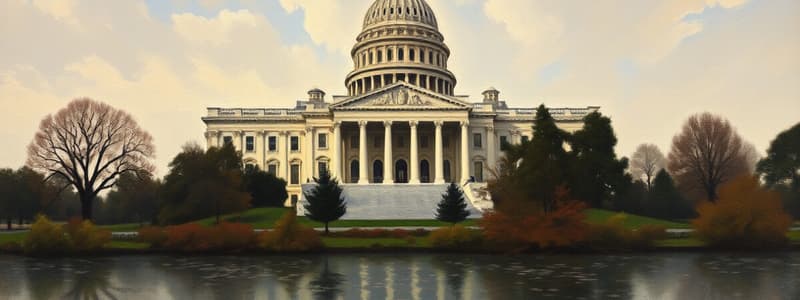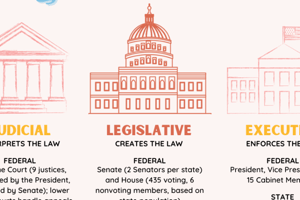Podcast
Questions and Answers
What is the main job of the Legislative Branch?
What is the main job of the Legislative Branch?
The main job of the Legislative Branch is to make laws.
What is the main job of the Executive Branch?
What is the main job of the Executive Branch?
The main job of the Executive Branch is to execute the law.
Where does one find the power of the President?
Where does one find the power of the President?
One finds the power of the President in the Oath of Office.
What is the main job of the Judicial Branch?
What is the main job of the Judicial Branch?
What is the point of the checks and balances system?
What is the point of the checks and balances system?
What are the Legislative checks over the Executive and Judicial Branch?
What are the Legislative checks over the Executive and Judicial Branch?
What are the Executive checks over the Legislative and Judicial Branch?
What are the Executive checks over the Legislative and Judicial Branch?
What are the Judicial checks over the Executive and Legislative Branch?
What are the Judicial checks over the Executive and Legislative Branch?
Which branch has the most checks?
Which branch has the most checks?
Why do we have Checks and Balances to begin with?
Why do we have Checks and Balances to begin with?
What Federalist Paper refers to the Checks and Balances system?
What Federalist Paper refers to the Checks and Balances system?
What is Madison's thought on human nature?
What is Madison's thought on human nature?
Flashcards are hidden until you start studying
Study Notes
Legislative Branch
- Main responsibility is to make laws.
- Has the most checks over other branches, detailed in Article 1.
Executive Branch
- Primary role is to execute and enforce laws.
- Holds power through the Oath of Office.
- Can veto legislation and appoint judicial judges.
Judicial Branch
- Focused on interpreting laws within the legal framework.
- Has the ability to declare laws and executive actions unconstitutional.
Checks and Balances
- Designed to prevent any one branch from becoming too powerful.
- Encourages accountability among the branches.
- Initiated due to historical fears of tyranny, particularly influenced by King George.
Legislative Checks
- Can impeach the president and approve presidential appointments.
- Has the authority to override a presidential veto with a two-thirds vote.
- May impeach judges and alter court structures.
Executive Checks
- Can veto legislation passed by Congress.
- The Vice President can break ties in the Senate.
- President's power to appoint federal judges serves as a check on the Judicial Branch.
Judicial Checks
- Can declare laws unconstitutional, limiting Legislative power.
- Can rule executive actions unconstitutional, limiting Executive authority.
Historical Context
- The concept of Checks and Balances stems from fears of concentrated power.
- Federalist Papers advocate for these checks to sustain equality among branches.
Madison's Perspective
- Believed in the inherent tendency of branches to seek power over one another.
- Multiple branches were necessary to counterbalance human greed for power.
Studying That Suits You
Use AI to generate personalized quizzes and flashcards to suit your learning preferences.




